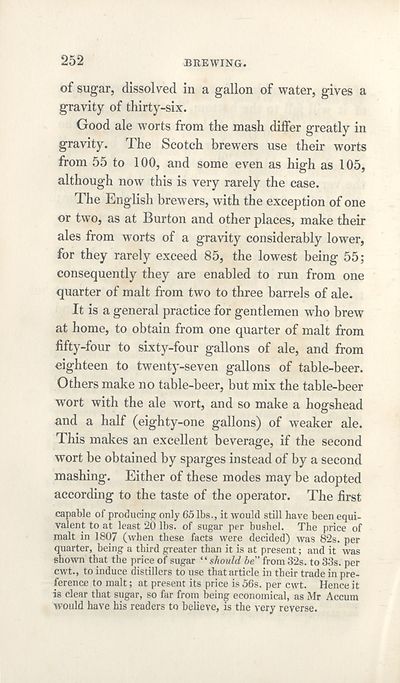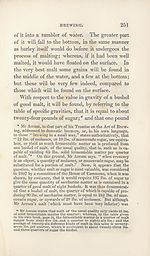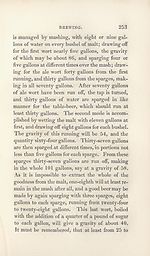Download files
Complete book:
Individual page:
Thumbnail gallery: Grid view | List view

252
BREWING.
of sugar, dissolved in a gallon of water, gives a
gravity of thirty-six.
Good ale worts from the mash differ greatly in
gravity. The Scotch brewers use their worts
from 55 to 100, and some even as high as 105,
although now this is very rarely the case.
The English brewers, with the exception of one
or two, as at Burton and other places, make their
ales from worts of a gravity considerably lower,
for they rarely exceed 85, the lowest being 55;
consequently they are enabled to run from one
quarter of malt from two to three barrels of ale.
It is a general practice for gentlemen who brew
at home, to obtain from one quarter of malt from
fifty-four to sixty-four gallons of ale, and from
eighteen to twenty-seven gallons of table-beer.
Others make no table-beer, but mix the table-beer
wort with the ale wort, and so make a hogshead
and a half (eighty-one gallons) of weaker ale.
This makes an excellent beverage, if the second
wort be obtained by sparges instead of by a second
mashing. Either of these modes may be adopted
according to the taste of the operator. The first
capable of producing only 65lbs., it would still have been equi¬
valent to at least 20 lbs. of sugar per bushel. The price of
malt in 1807 (when these facts were decided) was 82s. per
quarter, being a third greater than it is at present; and it was
shown that the price of sugar ‘ ‘ should be” from 32s. to 33s. per
cwt., to induce distillers to use that article in their trade in pre¬
ference to malt; at present its price is 56s. per cwt. Hence it
is clear that sugar, so far from being economical, as Mr Accum
would have his readers to believe, is the very reverse.
BREWING.
of sugar, dissolved in a gallon of water, gives a
gravity of thirty-six.
Good ale worts from the mash differ greatly in
gravity. The Scotch brewers use their worts
from 55 to 100, and some even as high as 105,
although now this is very rarely the case.
The English brewers, with the exception of one
or two, as at Burton and other places, make their
ales from worts of a gravity considerably lower,
for they rarely exceed 85, the lowest being 55;
consequently they are enabled to run from one
quarter of malt from two to three barrels of ale.
It is a general practice for gentlemen who brew
at home, to obtain from one quarter of malt from
fifty-four to sixty-four gallons of ale, and from
eighteen to twenty-seven gallons of table-beer.
Others make no table-beer, but mix the table-beer
wort with the ale wort, and so make a hogshead
and a half (eighty-one gallons) of weaker ale.
This makes an excellent beverage, if the second
wort be obtained by sparges instead of by a second
mashing. Either of these modes may be adopted
according to the taste of the operator. The first
capable of producing only 65lbs., it would still have been equi¬
valent to at least 20 lbs. of sugar per bushel. The price of
malt in 1807 (when these facts were decided) was 82s. per
quarter, being a third greater than it is at present; and it was
shown that the price of sugar ‘ ‘ should be” from 32s. to 33s. per
cwt., to induce distillers to use that article in their trade in pre¬
ference to malt; at present its price is 56s. per cwt. Hence it
is clear that sugar, so far from being economical, as Mr Accum
would have his readers to believe, is the very reverse.
Set display mode to:
![]() Universal Viewer |
Universal Viewer | ![]() Mirador |
Large image | Transcription
Mirador |
Large image | Transcription
| Antiquarian books of Scotland > Occupations > British wine-maker, and domestic brewer > (290) |
|---|
| Permanent URL | https://digital.nls.uk/126003401 |
|---|
| Description | Thousands of printed books from the Antiquarian Books of Scotland collection which dates from 1641 to the 1980s. The collection consists of 14,800 books which were published in Scotland or have a Scottish connection, e.g. through the author, printer or owner. Subjects covered include sport, education, diseases, adventure, occupations, Jacobites, politics and religion. Among the 29 languages represented are English, Gaelic, Italian, French, Russian and Swedish. |
|---|

